June Deniece Williams is an American singer. She has been described as "one of the great soul voices" by the BBC. She is best known for the songs "Free", "Silly", "It's Gonna Take a Miracle" and two Billboard Hot 100 No.1 singles "Let's Hear It for the Boy" and "Too Much, Too Little, Too Late". Williams has won four Grammys with twelve nominations altogether. She is also known for recording “Without Us”, the theme song of Family Ties.

"You Keep Me Hangin' On" is a song written and composed by Holland–Dozier–Holland. It was first recorded in 1966 by American Motown group the Supremes, reaching number one on the Billboard Hot 100. American rock band Vanilla Fudge released a cover version in June the following year, which reached number six on the Billboard Hot 100. Wilson Pickett recorded it in 1969. English singer Kim Wilde covered "You Keep Me Hangin' On" in 1986, reaching number one on the Billboard Hot 100 in June 1987. In the first 32 years of the Billboard Hot 100 rock era, "You Keep Me Hangin' On" became one of the six songs to reach number one by two different musical acts. In 1996, American country singer Reba McEntire's version reached number two on the US Billboard Hot Dance Club Play chart. The BBC ranked the Supremes' original song at number 78 on The Top 100 Digital Motown Chart, which ranks Motown releases by their all-time UK downloads and streams.

"Let the Music Play" is a song recorded by American singer Shannon and released on September 19, 1983, as both her debut single and the lead single from her 1984 debut studio album of the same name. Written by Chris Barbosa and Ed Chisolm, and produced by Barbosa and Mark Liggett, "Let the Music Play" was the first of Shannon's four number ones on the US Dance Club Songs chart, reaching the top spot in October 1983. It also became a huge crossover hit in the US, peaking at number two on the Hot R&B/Hip-Hop Songs chart and number eight on the Billboard Hot 100 in February 1984. It was Shannon's only Top 40 hit in the US. Some mark "Let the Music Play" as the beginning of the "dance-pop" era. "Let the Music Play" was ranked 43rd on the 2009 VH1 Special 100 Greatest One-Hit Wonders of the 1980s, while Rolling Stone and Billboard featured it in their lists of "200 Greatest Dance Songs of All Time" and "500 Best Pop Songs of All Time" in 2022 and 2023. The song also appears in the video games Dance Central 3 and Scarface: The World Is Yours.
"Always on My Mind" is a ballad written by Wayne Carson, Johnny Christopher, and Mark James, first recorded by Brenda Lee and first released by Gwen McCrae in March 1972. Lee's version was released three months later in June 1972. The song has been a crossover hit, charting in both the country and western and pop categories. Elvis Presley's recording was the first commercially successful version of the song.
"(I Know) I'm Losing You" is a 1966 hit single recorded by the Temptations for the Gordy (Motown) label, written by Cornelius Grant, Eddie Holland and Norman Whitfield, and produced by Norman Whitfield.
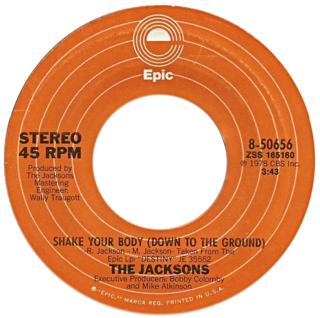
"Shake Your Body (Down to the Ground)" is a song recorded by the Jacksons for their 1978 album Destiny, and released as a single the same year. It peaked at No. 7 in the Billboard Hot 100 in May 1979.

"Hot Stuff" is a song by American singer Donna Summer from her seventh studio album Bad Girls (1979), produced by English producer Pete Bellotte and Italian producer Giorgio Moroder and released as the lead single from Bad Girls in 1979 through Casablanca Records. Up to that point, Summer had mainly been associated with disco songs but this song also showed a significant rock direction, including a guitar solo by ex-Doobie Brother and Steely Dan guitarist Jeff "Skunk" Baxter. It is the second of four songs by Summer to reach number one on the Billboard Hot 100.

"Play That Funky Music" is a song written by Rob Parissi and recorded by the band Wild Cherry. The single was the first released by the Cleveland-based Sweet City record label in April 1976 and distributed by Epic Records. The performers on the recording included lead singer Parissi, electric guitarist Bryan Bassett, bassist Allen Wentz, and drummer Ron Beitle, with session players Chuck Berginc, Jack Brndiar (trumpets), and Joe Eckert and Rick Singer (saxes) on the horn riff that runs throughout the song's verses. The single hit No. 1 on the Billboard Hot 100 on September 18, 1976; it was also No. 1 on the Billboard Hot Soul Singles chart. The single was certified platinum by the Recording Industry Association of America for shipments of over 2 million records and eventually sold 2.5 million in the United States alone.

"Caribbean Queen (No More Love on the Run)", initially released as "European Queen (No More Love on the Run)", is a 1984 song by Trinidadian-British singer Billy Ocean. Co-written and produced by Keith Diamond, it climbed to number one on both the US Billboard Hot 100 chart and the Billboard Black Singles chart, and number six on the UK Singles Chart. The song won Ocean the 1985 Grammy Award for Best Male R&B Vocal Performance, making him the first British artist to win in that category.
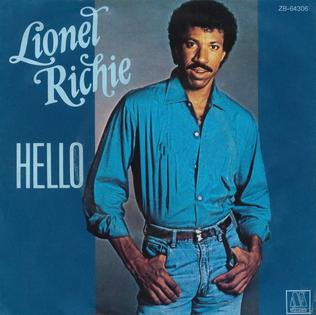
"Hello" is a song by American singer and songwriter Lionel Richie. Taken as the third single from his second solo album, Can't Slow Down (1983), the song was released in 1984 and reached number one on three Billboard music charts: the pop chart, the R&B chart, and the Adult Contemporary chart. The song also went to number one on the UK Singles Chart for six weeks.
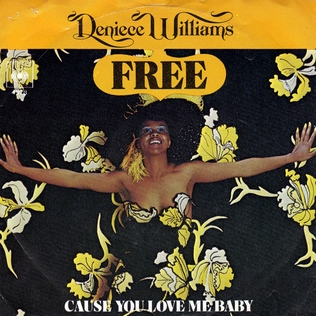
"Free" is a song by American singer Deniece Williams that was included on her album This Is Niecy. The song was written by Williams, Hank Redd, Nathan Watts and Susaye Greene and produced by Maurice White and Charles Stepney.

"The Power" is a song by German Eurodance group Snap!, released as their debut single. It was released on 3 January 1990 as the lead single from their debut studio album, World Power (1990). The song reached number one in Greece, the Netherlands, Spain, Switzerland, the UK and Zimbabwe, as well as on the US Billboard Hot Dance Club Play and Hot Rap charts. On the Billboard Hot 100, "The Power" managed to reach number two for one week.

"Point of No Return" is a single by the American pop group Exposé. Written and produced by Lewis Martineé, the single was originally released in 1984 on the Pantera label with Alejandra Lorenzo (Alé) as the lead singer. The single was re-recorded in 1987 with Jeanette Jurado as the lead vocalist and included on the group's debut album, Exposure (1987), when it was finally released on compact disc in 1989.
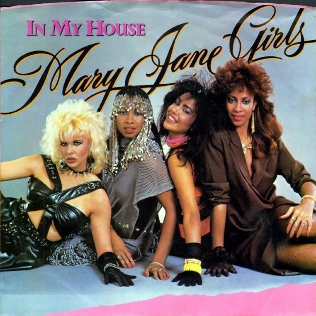
"In My House" is a song produced, written and arranged by American musician Rick James and recorded by his protégées, the Mary Jane Girls, for their second studio album, Only Four You (1985). It was released as the album's lead single in October 1984 by Gordy Records. In the United States, the single topped Billboard's Dance Club Songs chart in April 1985 and remained atop the chart for two weeks. It also reached the top 10 on both the Billboard Hot 100 and Billboard Hot R&B/Hip-Hop Songs chart, peaking at number seven on the Hot 100 in June 1985 and remained in the top 40 for 12 weeks. It is the group's highest-peaking single and their only top-40 entry on the Billboard Hot 100, although they have had other singles succeed on both the R&B and dance charts.

"I'm Gonna Let My Heart Do the Walking" is a disco-styled soul single composed by the Holland brothers Eddie and Brian, members of the former Holland–Dozier–Holland team and was released as a single by Motown vocal group The Supremes in 1976 on the Motown label. It was the first single since "Your Heart Belongs to Me" in 1962 to feature four Supremes. It is also notable for being the last top forty single the group would score before they disbanded in 1977.

"Almost Paradise... Love Theme from Footloose" is the title of a duet sung by Mike Reno of Loverboy and Ann Wilson of Heart. It is one of several major hits written by singer Eric Carmen with lyricist Dean Pitchford, another being "Make Me Lose Control".
"Running with the Night" is the second single released from American singer and songwriter Lionel Richie's multi-platinum and Grammy Award-winning 1983 album, Can't Slow Down. Richie co-wrote the song with songwriter Cynthia Weil and co-produced it with James Anthony Carmichael.
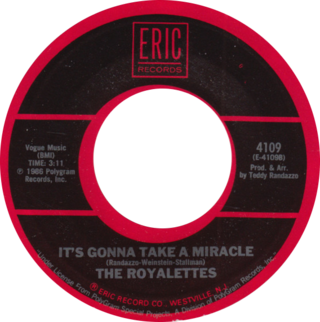
"It's Gonna Take a Miracle" is a song written by Teddy Randazzo, Bobby Weinstein, and Lou Stallman. It was first an R&B hit in 1965 for The Royalettes, which reached the Top 30 on the U.S. R&B chart and peaked at number 41 on the Billboard Hot 100 and number 37 on Cash Box.
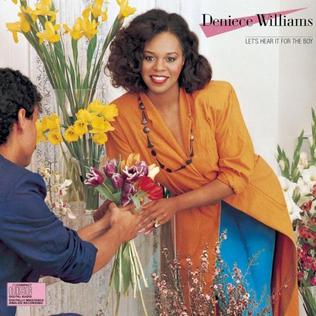
Let's Hear It for the Boy is the eighth studio album by American recording artist Deniece Williams, released on April 16, 1984, by Columbia Records. The album reached No. 26 on the US Billboard 200 Albums chart and No. 10 on the US Billboard Top R&B/Hop-Hop Albums chart.

"Darling Be Home Soon" is a song written by John Sebastian of the Lovin' Spoonful for the soundtrack of the 1966 Francis Ford Coppola film You're a Big Boy Now. It appeared on the Lovin' Spoonful's 1967 soundtrack album You're a Big Boy Now. Sebastian performed his composition at Woodstock; it was the fourth song out of the five he performed at the 1969 music festival in White Lake, New York.
















